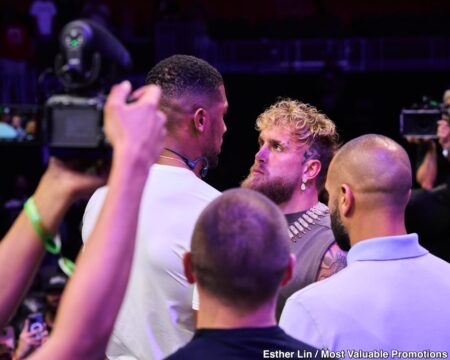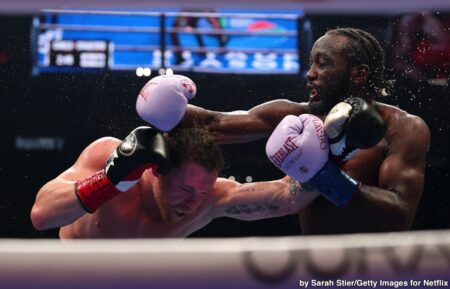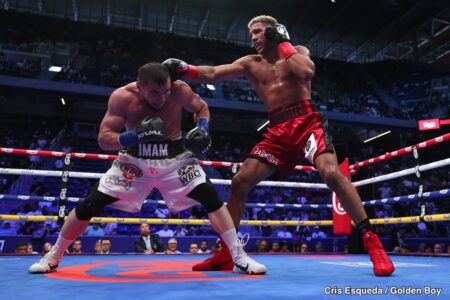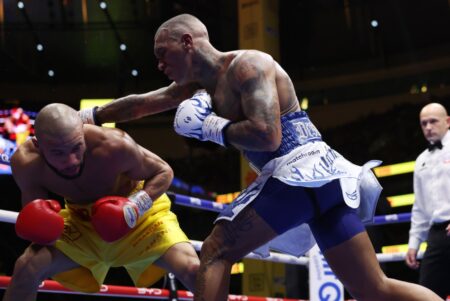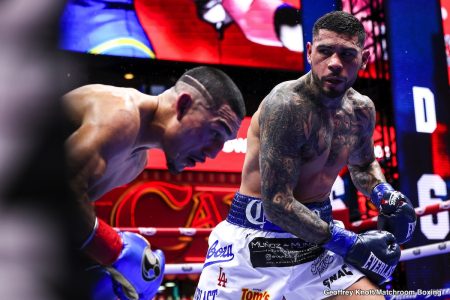The Fateful Moment at the Barclays Center
On a bustling evening at the Barclays Center in Brooklyn, New York, the much-anticipated clash between WBA lightweight champion Gervonta ‘Tank’ Davis and challenger Lamont Roach was marred by a controversial decision in the ninth round. Roach, known for his tenacity and skill, landed a crisp jab to Davis’ head, causing the champion to take a knee. What followed was a sequence of events that left Roach’s manager, Robert Diaz, fuming with frustration. Davis, after getting up, turned his back to Roach and walked to his corner. The referee, Steve Willis, did not stop the count or rule it a knockdown, a decision that would have significant implications on the fight’s outcome. Despite this oversight, the bout continued, eventually ending in a 12-round majority draw.
Robert Diaz: An Outcry for Justice
Diaz’s outrage was palpable immediately after the incident. He sprinted over to the New York State Athletic Commission personnel on site, demanding clarity on the referee’s call. "What are we calling it? I just want to know what you’re calling it. Everyone saw that it was a knockdown. You don’t want to give him a knockdown? You turn your back, that’s a disqualification," Diaz vehemently argued. His point was clear: under standard boxing rules, when a fighter takes a knee and then walks away from the action, it should be called a knockdown, and turning the back to the opponent can lead to a disqualification. The fact that these two crucial calls were missed by the referee deeply affected the fight’s result, robbing Roach of potential victory.
The Referee’s Contested Decision
Steve Willis, the referee, faced intense scrutiny for his handling of the ninth round. When Davis took a knee and then walked away, the count should have continued until Roach was back in a neutral position. Instead, Willis halted the count, allowing Davis to regroup without the penalty of a knockdown. This decision not only violated the spirit of the rules but also seemed to favor the champion. Adding insult to injury, when Davis claimed he had grease in his eyes, it was a weak excuse that rarely holds water. Fighters frequently encounter such issues during a bout, and the standard protocol is to wipe their eyes and continue immediately. Why, then, was Davis given the leeway to take a knee and walk to his corner?
Perceived Favoritism and Special Treatment
The controversy was further fueled by the superstar status of Gervonta ‘Tank’ Davis. As a widely recognized and popular fighter, Davis has a significant following. However, this popularity may have contributed to what many perceived as special treatment. Diaz’s frustration stemmed from the belief that a less famous fighter would not have been afforded the same leniency. "There are two disqualifications and a knockdown. If he gets the knockdown, he gets the win," Diaz emphasized, highlighting the importance of fair and consistent officiating in boxing. The missed calls not only impacted the fight’s outcome but also cast a shadow of doubt over the integrity of the sport.
The Aftermath and the Call for a Rematch
In the days following the fight, the boxing community remained abuzz with debates over the referee’s decision. Diaz, still seething from the perceived injustice, promised to take the matter further. "When he started counting, how do you stop your count? I’m going to give it to Monday, make the call and talk to people and say, ‘What happened here?’ I don’t see them reversing the decision, but I do see them saying, ‘Okay, let’s do a rematch,’" Diaz declared. While the New York State Athletic Commission is unlikely to overturn the result, the clamor for a rematch is growing. Fans and boxing experts alike agree that the integrity of the sport demands a fair and transparent review of the events.
Looking Forward: The Need for Accountability
The incident at the Barclays Center has reignited discussions about the accountability of referees and the need for stricter adherence to boxing rules. While Davis may have had a valid reason for his distress, the referee’s failure to enforce the rules consistently has led to a tainted result. This episode serves as a stark reminder that even in the high-stakes world of professional boxing, the principles of fairness and justice must prevail. The boxing community is hopeful that the New York State Athletic Commission will take a proactive role in ensuring that such controversies are minimized in the future, perhaps by implementing more rigorous training and oversight for referees. For Robert Diaz and Lamont Roach, the fight may have ended in a draw, but the battle for fair play is far from over.



